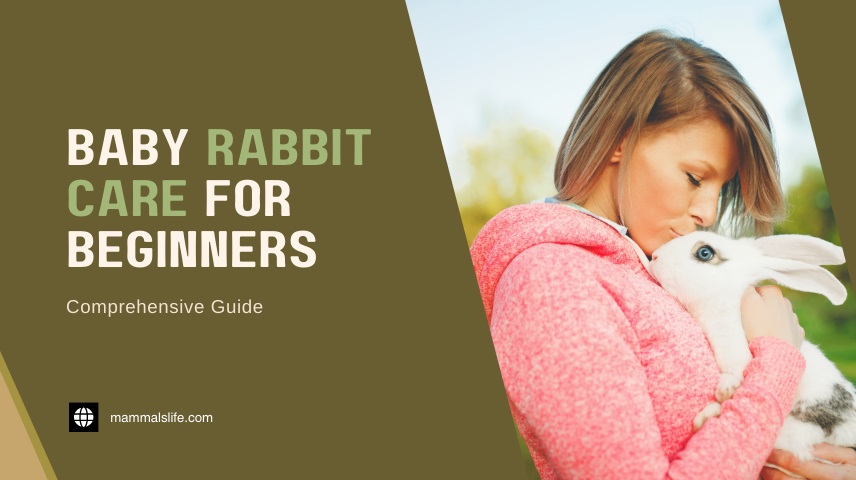Last Updated on February 22, 2025 by Mammals Life
Baby rabbits need a warm, safe environment and proper nutrition to thrive. Handle them gently and ensure they stay with their mother if possible.
Caring for baby rabbits requires knowledge and attention to detail. These delicate creatures depend on their caregivers for warmth, nutrition, and safety. A suitable habitat is essential, providing a comfortable and secure space free from hazards. Proper nutrition is crucial; baby rabbits generally nurse from their mothers, receiving essential nutrients for growth.
If the mother is unavailable, a specialized formula can be used. Always handle baby rabbits with care, as they are fragile and easily stressed. Regular health checks are vital to ensure they are developing properly. By following these guidelines, you can help baby rabbits grow into healthy, strong adults.
Baby Rabbit Care For Beginners
Raising a baby rabbit can be a delightful and rewarding experience. These tiny, fluffy creatures bring joy and companionship, but they also require proper care and attention. For beginners, understanding the basics of baby rabbit care is essential to ensure your new pet grows into a healthy and happy adult. This guide will cover everything you need to know to get started.
Preparing For Your Baby Rabbit
Before bringing your baby rabbit home, ensure you have all the necessary supplies. Having the right items ready will make the transition smoother for your new pet.
- Housing: Choose a spacious cage or hutch with enough room for your rabbit to move around.
- Bedding: Use hay or straw bedding to keep your rabbit comfortable and warm.
- Food and Water: Stock up on high-quality rabbit pellets, fresh vegetables, and a water bottle.
- Toys and Chews: Provide safe chew toys to keep their teeth healthy and prevent boredom.
Here’s a quick checklist of items you’ll need:
| Item | Description |
|---|---|
| Cage/Hutch | Spacious and secure living space |
| Bedding | Hay or straw for comfort |
| Food | High-quality pellets and fresh veggies |
| Water Bottle | Fresh water supply |
| Toys | Safe chew toys |
Creating A Safe Living Space
Ensure your rabbit’s living space is safe and secure. A well-constructed cage or hutch protects them from potential dangers.
Follow these tips to create a safe environment:
- Location: Place the cage in a quiet, draft-free area away from direct sunlight.
- Size: The cage should be large enough for your rabbit to hop, stretch, and turn around comfortably.
- Flooring: Use solid flooring to prevent injury to their delicate feet. Avoid wire floors.
- Escape-Proof: Ensure the cage is secure and escape-proof. Rabbits are curious and can squeeze through small gaps.
Regularly clean the cage to maintain hygiene. Remove soiled bedding and replace it with fresh material. Check for any potential hazards such as sharp edges or loose wires.
Feeding Your Baby Rabbit
Proper nutrition is crucial for the growth and development of your baby rabbit. A balanced diet will keep them healthy and energetic.
Include the following in their diet:
- Hay: Fresh hay should make up the majority of their diet. It aids digestion and keeps their teeth healthy.
- Pellets: Choose high-quality rabbit pellets. Feed according to the package instructions.
- Vegetables: Introduce fresh vegetables gradually. Leafy greens like romaine lettuce, parsley, and cilantro are good choices.
- Water: Ensure fresh water is always available. Use a water bottle attached to the cage for convenience.
Avoid feeding your baby rabbit sugary treats, processed foods, or anything toxic to rabbits. Monitor their eating habits and consult a vet if you notice any changes.
Handling And Socializing Your Baby Rabbit
Proper handling and socialization are essential for a well-adjusted rabbit. Gentle handling helps build trust and strengthens your bond.
Follow these tips for safe handling:
- Support: Always support their hind legs and back when picking them up.
- Gentle Touch: Use gentle and slow movements. Avoid sudden or loud actions that may startle them.
- Short Sessions: Keep handling sessions short initially, gradually increasing as they become more comfortable.
Socialize your rabbit by spending time with them daily. Allow them to explore a safe, enclosed area under supervision. Offer treats and gentle petting to create positive associations.
Health And Wellness
Regular health checks are vital to ensure your baby rabbit stays healthy. Look for any signs of illness and consult a vet if needed.
Common health checks include:
- Eyes and Ears: Check for discharge or signs of infection.
- Teeth: Ensure their teeth are not overgrown. Provide chew toys to help wear them down.
- Coat: Inspect their fur for cleanliness and parasites.
- Weight: Monitor their weight to ensure they are growing properly.
Keep their living space clean to prevent infections. Provide a balanced diet and fresh water. Regular vet visits ensure any potential health issues are addressed promptly.
Training And Behavior
Training your baby rabbit is important for their mental stimulation and well-being. Simple training techniques can teach them good habits.
Basic training tips include:
- Litter Training: Place a litter box in their cage. Use hay to encourage use. Reward them when they use it.
- Commands: Use simple commands like “come” or “no”. Reward them with treats for following commands.
- Playtime: Provide toys and engage in interactive play to keep them mentally stimulated.
Consistency and patience are key. Positive reinforcement helps encourage good behavior. Avoid punishment as it can create fear and stress.
Transitioning To Adulthood
As your baby rabbit grows, their needs will change. Transitioning to adulthood requires adjustments in their care routine.
Monitor these changes:
- Diet: Gradually introduce adult rabbit food. Continue providing fresh hay and vegetables.
- Space: Ensure their living space is still suitable for their size. Consider a larger cage if needed.
- Socialization: Continue regular handling and socialization. Adult rabbits enjoy companionship.
Regular vet check-ups ensure they transition smoothly. Keep an eye on their behavior and health, making adjustments as necessary.
Frequently Asked Questions
How Often Should I Feed My Baby Rabbit?
Baby rabbits should be fed twice daily with fresh hay, water, and pellets.
What Type Of Hay Is Best For Baby Rabbits?
Timothy hay is ideal for baby rabbits as it provides essential nutrients and fiber.
Can Baby Rabbits Eat Vegetables?
Introduce vegetables gradually after 12 weeks. Start with small amounts of leafy greens like romaine lettuce.
How Do I Keep My Baby Rabbit Warm?
Use a soft blanket and ensure their living area is draft-free to keep your baby rabbit warm.
When Can Baby Rabbits Be Handled?
Handle baby rabbits gently after 3 weeks to help them get accustomed to human interaction.
Conclusion
Caring for baby rabbits requires patience and knowledge. Provide them with a safe, nurturing environment. Ensure they have a balanced diet, regular vet check-ups, and plenty of love. With proper care, your baby rabbits will grow into healthy, happy companions.
Follow these tips and enjoy a rewarding experience with your furry friends.








